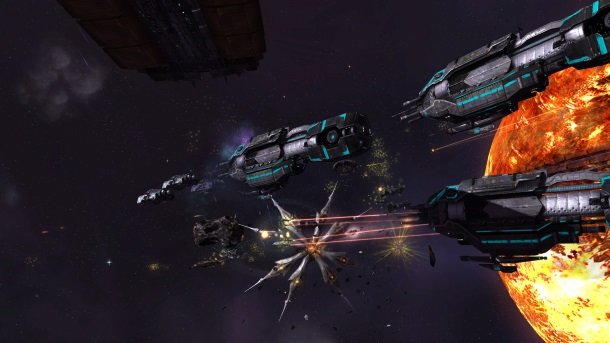Sins of a Solar Empire studio speaks out about new Rebellion legal action

Sniper Elite studio Rebellion Developments filed a lawsuit against Ironclad Games in 2012 over Sins of a Solar Empire: Rebellion , claiming that the title infringed on Rebellion's trademark. A judge dismissed the case more than a year ago, ruling that the title qualifies as "expressive speech" and is thus protected by the First Amendment, and if you're wondering why you didn't hear anything about it until now, it's because Ironclad opted to not to publicize the victory in an effort to "let bygones be bygones." But now Rebellion has launched new legal action against the game in Canada and the U.K., and that's prompted Ironclad to speak up.
In a blog post that went up last week, Ironclad Games Director Blair Fraser spoke in detail about the studio's First Amendment victory over Rebellion, explaining what led to the legal action, the nature of its defense and the potential impact of the decision on the gaming industry as a whole. What he didn't make clear is why the studio opted not to speak about the dismissal of the suit, which actually happened in May 2013, until now.
"We don't like to talk about the business side of things in public. The focus should be on the games themselves," Fraser told us. "We never brought up the cease and desist. We never talked about being served. We never commented when the story broke in the news. We never spoke when we won the case. We kept silent for over two years. However, last week we decided to break our silence."
Fraser said Ironclad decided to speak out now for two reasons: moral and strategic. "For years now there has been a growing sense in our company that trademark issues in the gaming industry were getting out of hand and that talking about our experience might help," he explained. "Our hope is that other developers will see this and be willing to explore, maintain and defend their freedom of expression without as much worry."
On the strategic side of the coin, he said that exposing this kind of behavior to the public can be a "powerful force" in its own right. "The gaming community is not simply content with buying the next cool widget regardless of who made it or how it was made," he continued. "Negative public response increases the cost of legal action to more than just legal fees - there is a public relations bill to pay on top. When we received confirmation last week that Rebellion Developments was taking this global we decided to direct attention to the facts and publicly available documents. We'll let the public decide how to interpret them."
Despite the decisive win in U.S. courts, differences in trademark law, precedents and various other factors means that a victory in Canada, the U.K. or anywhere else is far from a sure thing. Nonetheless, he has no interest in changing the name of Sins of a Solar Empire: Rebellion in order to suit Rebellion's demands.
"I don't know why Star Wars: Rebellion was renamed to Star Wars: Supremacy in the U.K. but I'll quit my job before I ever let there be a Sins of a Solar Empire: Supremacy or any other bastardization," he said. "Everything in Sins of a Solar Empire: Rebellion, including the gameplay, the lore, the cinematic, the logo, the factions, the research subjects, the capital ships, the Titans, and every single asset was designed to fit into the overarching theme of 'rebellion.' No other word in the English language comes even close."
The biggest gaming news, reviews and hardware deals
Keep up to date with the most important stories and the best deals, as picked by the PC Gamer team.
But while he's not willing to give up the title, he is hopeful that something can be worked out. "The disappointing part is that if one of the Kingsley brothers had called us up on the phone from the start and discussed the matter in a polite and reasonable manner I think this would have turned out a lot different. As a means of introduction, having a third party send a letter containing threats, demands, and accusations can set things off on the wrong foot. I can see all the business hawks rolling their eyes at what they see as an overreaction to what I assume is par for the course, [thinking] 'Lawyers will be lawyers and companies have to act aggressively to defend their trademarks or else risk losing them.' Well, that isn't how we do business," he said. "Surely, there is a better way to defend a trademark. Perhaps it's not too late to get back on the right foot."

Andy has been gaming on PCs from the very beginning, starting as a youngster with text adventures and primitive action games on a cassette-based TRS80. From there he graduated to the glory days of Sierra Online adventures and Microprose sims, ran a local BBS, learned how to build PCs, and developed a longstanding love of RPGs, immersive sims, and shooters. He began writing videogame news in 2007 for The Escapist and somehow managed to avoid getting fired until 2014, when he joined the storied ranks of PC Gamer. He covers all aspects of the industry, from new game announcements and patch notes to legal disputes, Twitch beefs, esports, and Henry Cavill. Lots of Henry Cavill.

